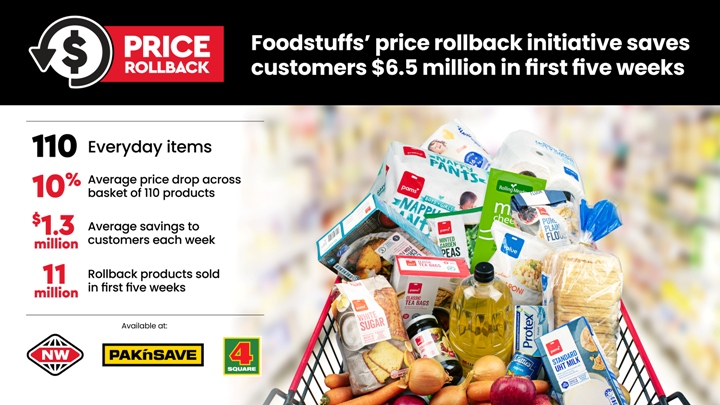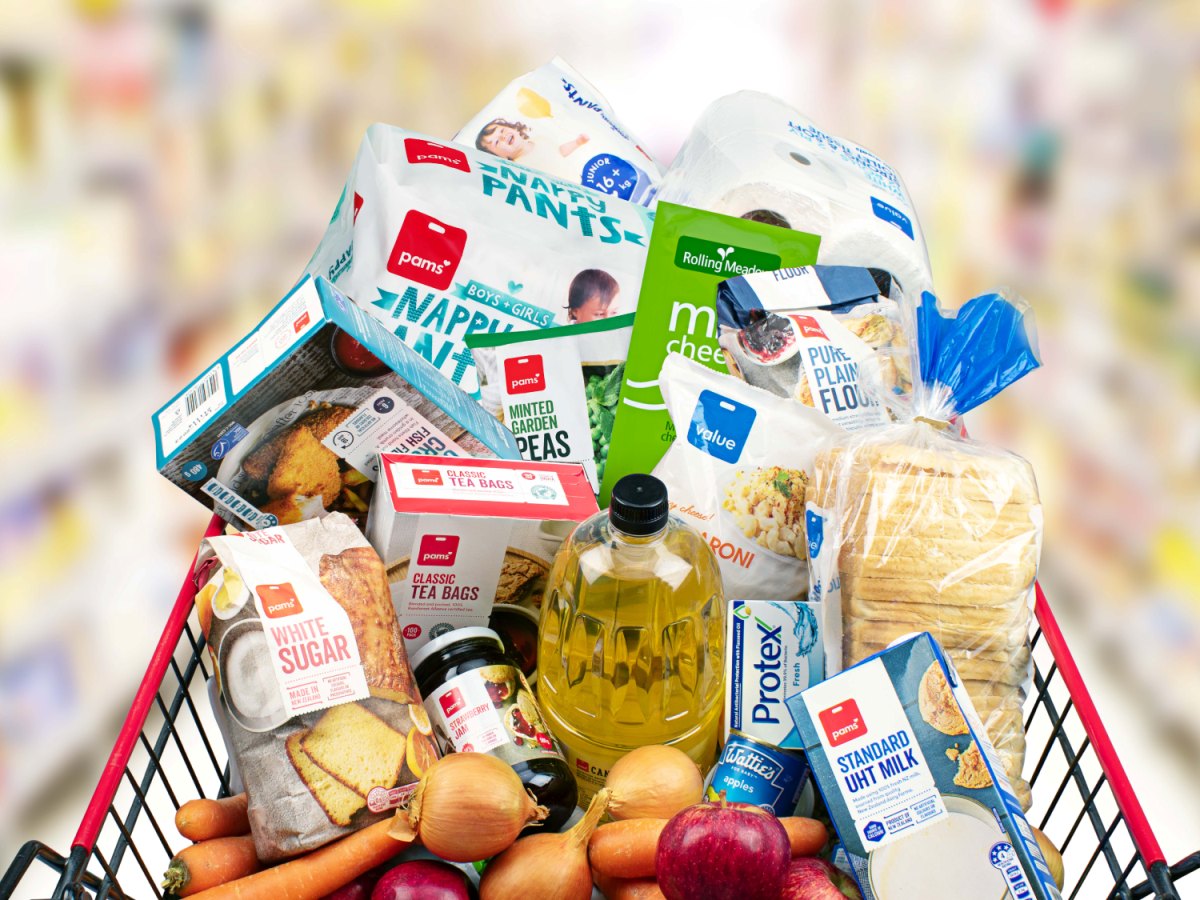- 11 million grocery products purchased in first five weeks of Price Rollback initiative.
- Customers saving an average of $1.3 million a week on Rollback essentials nationally.
- Butter at 2021 pricing most popular, with over 1 million blocks sold in first five weeks.
- Foodstuffs stores held grocery price increases 2.1% below food price inflation in May.
As inflation continues to drive price increases across the board, Kiwis have, so far, saved a total of $6.5 million on their weekly groceries as a result of Foodstuffs rolling back and reducing prices by an average of 10% on 110 essential grocery items to early 2021 levels, as part of the co-operatives’ actions to help ease the pressure on household budgets.
With food price increases at record levels globally, the two New Zealand owned co-operatives whose members locally operate the New World, PAK’nSAVE, and Four Square brands launched the Price Rollback initiative in mid-May, in a move that immediately reduced prices and was estimated at the time to save customers over half a million dollars each week nationally.
Foodstuffs NZ Managing Director, Chris Quin, says the savings customers have made in the first five weeks of the 13 week-long initiative are more than double the co-operatives’ commitment and estimations. The Price Rollback has meant Foodstuffs stores’ impact of reducing prices actually held grocery price increases at 4.7%, 2.1% below the food inflation rate of 6.8% in May.

“Every day, Kiwi shoppers and businesses are waking up to more headlines about price increases on everything from electricity, flights, fuel, restaurant meals and mortgages so we’re working hard to help customers find value every day. One of the goals we set ourselves was to keep prices increases lower than food price inflation and we are delivering this.”
“We’re tracking the results of the Price Rollback really closely. Our latest data shows customers are using the Rollback to save money on their weekly shop. In the first five weeks the Price Rollback has been running, 11 million of these grocery products have been purchased by our customers at a total saving of $6.5 million for our customers on these essential items.
“Averaging at $1.3 million in savings for customers each week, the Rollback Initiative has been funded 100% by Foodstuffs’ co-operative members, who own and operate their store in each community, are on the shop floor every day and committed to their local communities. As a result of this initiative, our stores are selling some items below cost.”
“This initiative is providing real savings for our customers, our store owners are absolutely committed to Rollback because they know the challenges their communities are facing this winter, with inflation eating into their household budgets.”
Foodstuffs identified 110 of the most commonly shopped grocery items to be rolled back and New World, PAK’nSAVE, and Four Square stores reduced prices by an average of 10% across this basket of goods. The basket includes frozen and fresh fruit and veges, meat and dairy products like butter and cheese, tea, coffee, sugar, flour, and personal care items like nappies and soap.
“These groceries are an important part of our customers’ weekly shop, and they have bought 11 million of them over the five-week period. The most popular products purchased in the rollback have been everyday essentials like butter and bread,” says Quin.
Top five items bought on Rollback to date
| Top five products sold by quantity | Amount sold | ||
| PAMS BUTTER 500G | 1,035,297 | ||
| VALUE TOAST 600G | 824,819 | ||
| TOMATOES CHOPPED IN JUICE 400G | 431,471 | ||
| NZ LAMB SHOULDER CHOPS | 222,288 | ||
| PAMS UHT MILK STANDARD 1L | 194,864 |
Foodstuffs’ initiative has reduced prices on key products at New World, PAK’nSAVE, and Four Square stores nationwide. For example, customers shopping at New World in the North Island have seen Value White Toast, 600g, rolled back from $1.50 to $1.19, Pams Edam Cheese, 1kg block reduced from $11.55 to $9.99, and Pams Butter 500g from $7.49 to $5.39. In South Island New World stores, some examples of products in the rollback include 1.5kg Pams Rolled Oats going from $4.29 to $3.94, and NZ lamb shoulder chops going from $19.99 to $16.75. These items are labelled in store and online under ‘Rollback’ so they are easy for customers to find.
The most recent Stats NZ Food Price Index (FPI) found in May, the weighted increase of food prices on the FPI basket of goods was 6.8%. The average cost price increase to Foodstuffs from their suppliers over the same weighted basket of products in the month of May was 6.9%.
Data from Foodstuffs shows the price of the same basket of goods measured in the Stats NZ FPI increased by an average of 4.7% for PAK’nSAVE, New World and Four Square customers in May, meaning Foodstuffs stores held grocery price increases below inflation and below supplier increases in May.
Quin says the co-operatives have been able to hold price increases for customers below inflation in May due to the impact of the Price Rollback Initiative and an ongoing focus on delivering value to customers, despite ongoing cost pressures.
“Globally, food cost increases and the pace of food price inflation are at near record levels and while New Zealanders are facing rising costs across the board, the supermarket checkout is the place where all of the cost pressures are coming to a head.
“Transport and fuel costs, global supply chain issues, currency changes, skills shortages and increases in the price of equipment and ingredients are just a few of the challenges our suppliers are facing, and are adding to the cost of growing, making and retailing groceries in Aotearoa.
“The Price Rollback initiative to reduce prices and our ongoing focus on value has played a big part in keeping food price increases below inflation, and we’re doing everything we can as a business to help out, and moving with urgency to implement all of the market study recommendations within our control.
“Due to the external and domestic factors pushing up inflation, the rest of 2022 will remain challenging for New Zealand households. Our co-operative members are committed to providing good data to customers so they know what’s really happening with prices when they do their weekly shop.
“Accurate data is critical in these extraordinary times of high inflation so our customers know we are working hard to deliver value. As stated in the Commerce Commission’s final market study report, our returns are in line with those of other international grocery retailers and, within the 19 cents of every dollar on the supermarket shelf we’re responsible for, we’re working to keep costs under control, we’re buying well and finding efficiencies in our business so we’re delivering the very best value to New Zealanders.”



